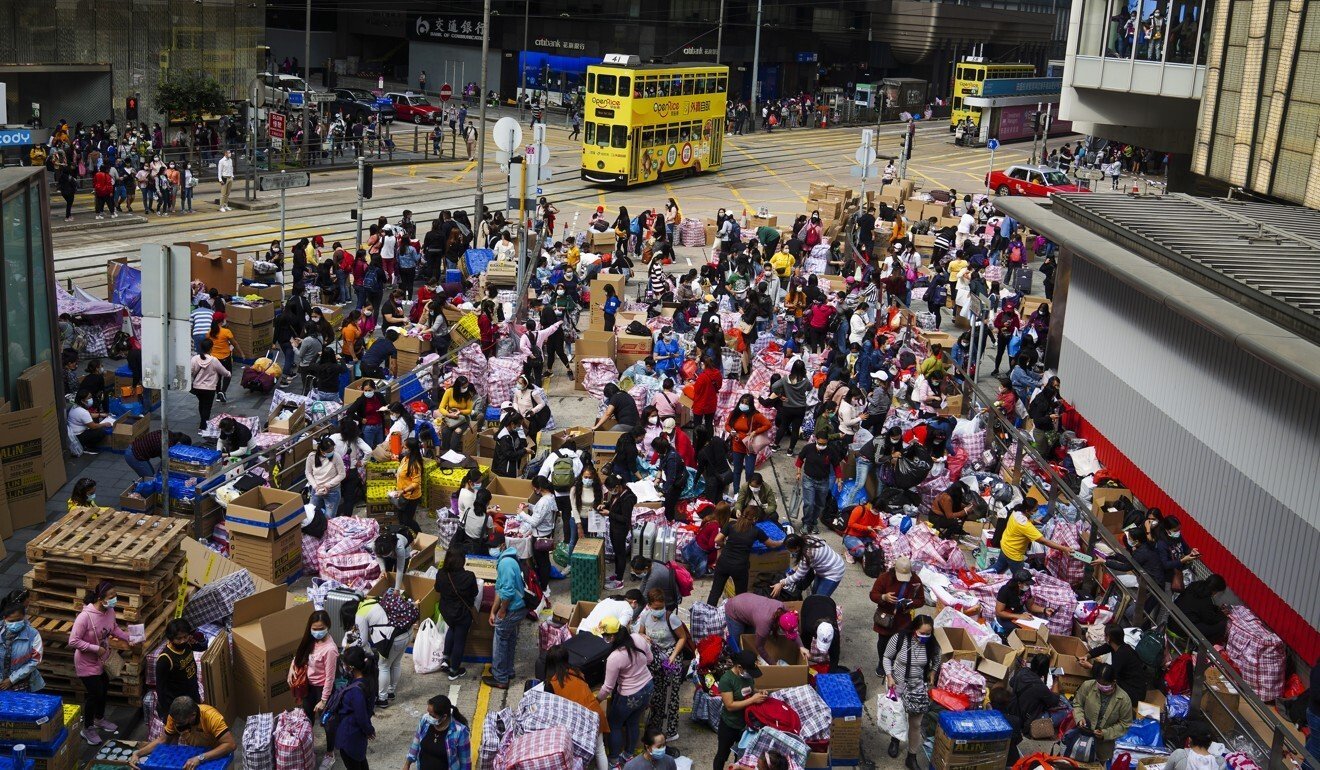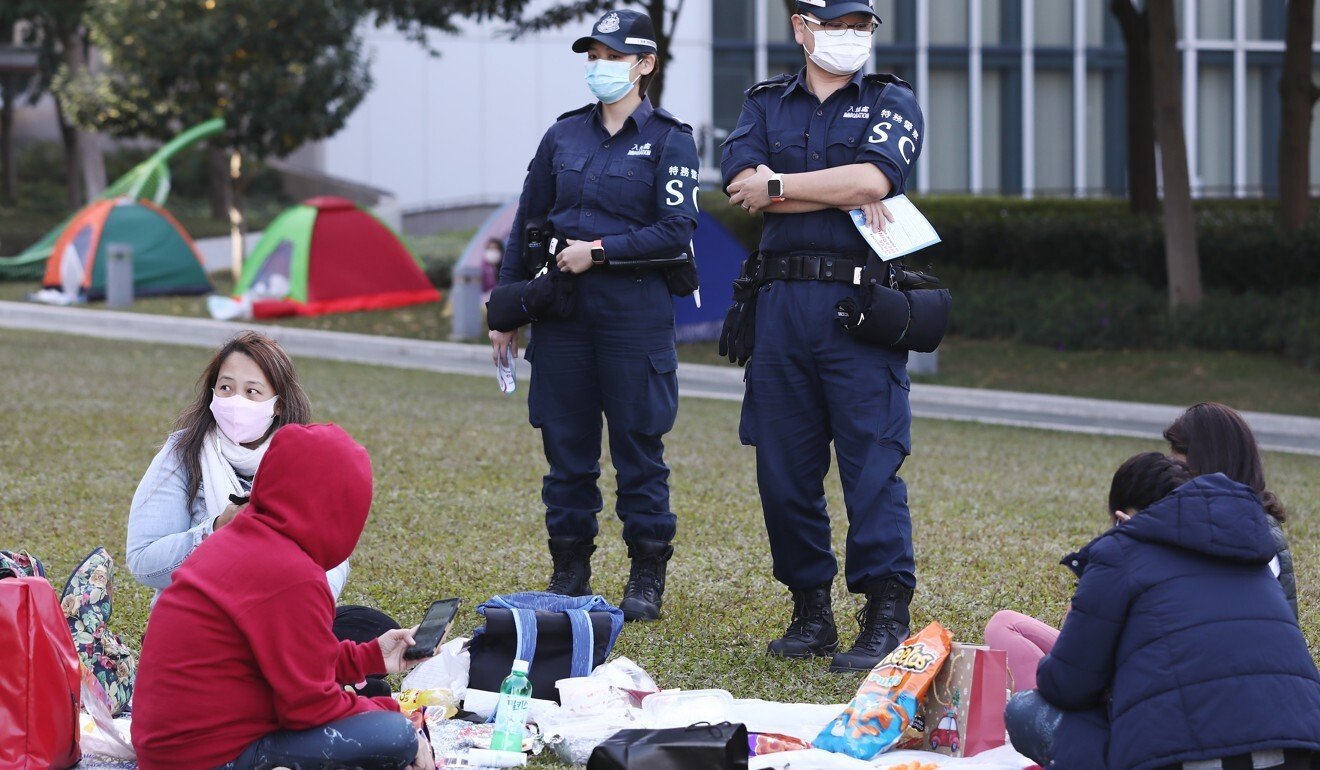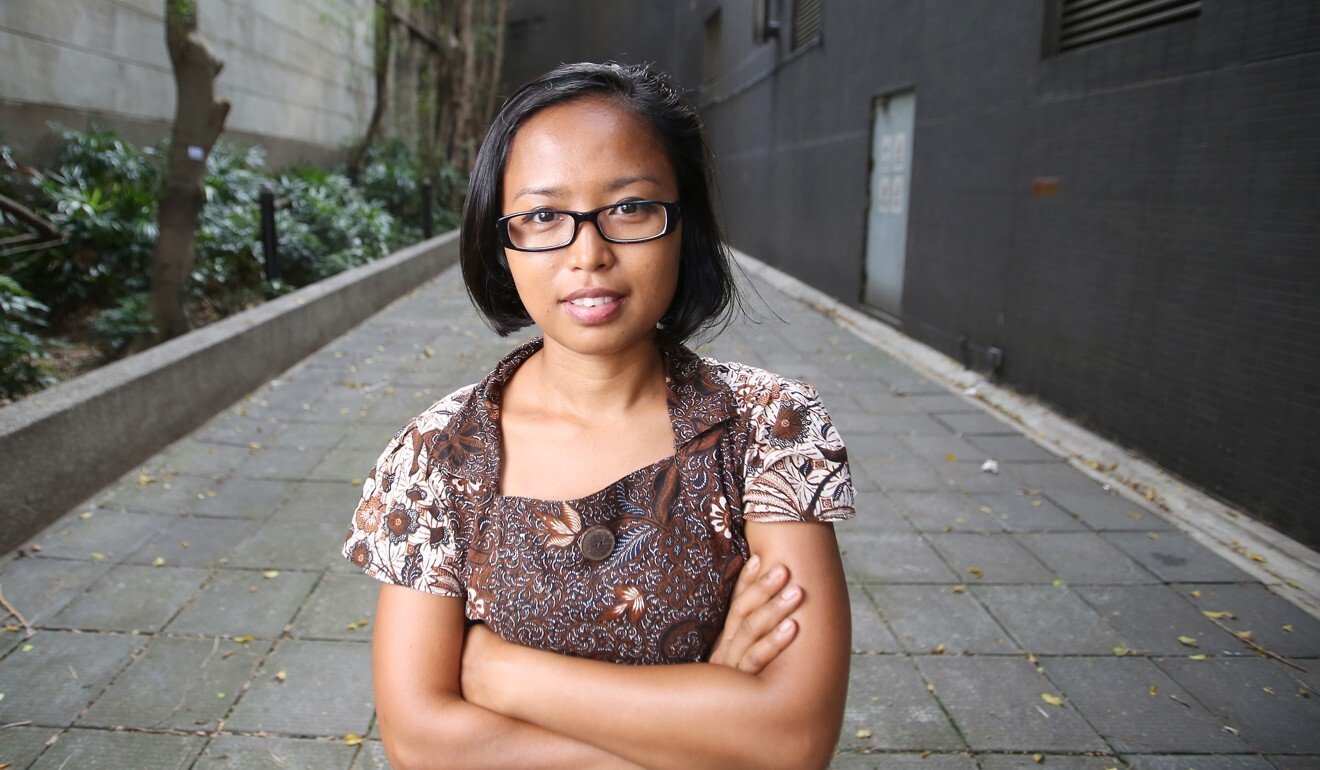Some households have given up finding helpers to ease financial burden, while others hunt for workers still in city as pandemic causes travel and visa delays.
Hongkonger Chloe Ma is five months pregnant and looking for a domestic worker to help with the housework when her first child is born.
Ma, 34, a marketing professional, started contacting employment agencies last month, hoping to hire a worker for her home in Wan Chai by March. But she was surprised to find that choices were limited, as Covid-19 travel restrictions hindered arrivals from overseas.
“I’m expecting my baby in May so I set aside a few months to find a suitable domestic helper. But there are fewer available now,” she says.
At Christmas, the Hong Kong government extended the hotel quarantine period for all arrivals – except those from mainland China, Macau and Taiwan – from 14 days to 21.
Employers of domestic helpers who had gone home to see their families before the extension found they now had to fork out an extra week of hotel fees for their returning workers, while new helpers seeking to start work in the city also had to contend with the lengthened quarantine.
The hurdles have led to Ma and her husband, 36, a banker, turning to available helpers currently in the city.
According to Ma, many domestic helpers with years of experience working in Hong Kong now demand a monthly salary of more than HK$5,000, about 8 per cent higher than the statutory minimum of HK$4,630, and some also seek better living conditions.
Ma says they have met six candidates so far, but have yet to make a decision: “We want to find the most suitable one as she will become part of the family and take care of our baby.”

Hong Kong has more than 398,000 foreign domestic helpers, mostly from the Philippines and Indonesia.
The Covid-19 pandemic has disturbed market dynamics of the sector in Hong Kong. Some workers have shunned the city while others have had their visa and employment applications delayed. The plunging supply has made it harder than before for employers to find suitable helpers.
Employers say they are left with fewer choices, face greater financial pressure, and struggle to deal with job-hopping helpers on the hunt for higher wages and better contract terms.
Domestic helpers complain they are burdened with longer hours and heavier workloads, while some fear losing their jobs amid the grim economic outlook.
Pandemic stunts supply
Mike Cheung, president of the Hong Kong-based Overseas Employment Centre, says overall there has been a decrease in demand for domestic helpers during the pandemic, as families do not want to deal with financial pressures, while work-from-home arrangements enable them to care for their loved ones.
He says the number of clients has fallen 50 per cent monthly on average. Despite the smaller market, as the flow of domestic helpers from overseas has dried up, demand still outstrips supply, he says. “The greater problem now is less supply, so we are unable to meet existing demands.”
Cheung says the process of bringing in new helpers from overseas, mainly the Philippines and Indonesia, including applying for passports and visas, has been delayed because of the pandemic. The number of helpers his agency recruits from the two countries has halved to between 400 and 500 a month.
Jen, a 36-year-old domestic helper from Indonesia, has been waiting for a year for an offer to return to Hong Kong for work.
Single and asking to be identified only by her given name, Jen, who worked for two families in Hong Kong from 2002 to 2013 before returning to Indonesia to take care of her sick mother, says she has stayed home ever since, helping at her sister’s snack store.
Because of low wages and few job opportunities at home, coupled with a sluggish economy during the pandemic, she wants to return to Hong Kong to better support her family and herself.
But with the ongoing health crisis, many employment agencies in Indonesia stayed closed for most of last year, and she has switched between four firms.
“The pandemic has made it more difficult for domestic helpers to apply for work in Hong Kong,” says Jen, who is an advocate with the Association of Indonesian Migrant Workers’ Families.
She says some helpers have seen their applications delayed, flights cancelled, and offers withdrawn as employers are put off by extra expenses such as hotel quarantine costs.
Attracting helpers with better terms
The lack of domestic helpers coming from overseas has made those who are already in Hong Kong more prized, and employers are willing to offer better contract terms.
HelperChoice, a Hong Kong-based platform formed in 2012 to connect helpers with employers in Asia, has seen a preference among households for workers who are already in Hong Kong with a completed or terminated contract, according to Mahee Leclerc, head of business development.
Leclerc says there are more employers willing to offer private rooms – a sought-after perk – for their helpers, accounting for 72 per cent of adverts posted on the platform in 2020, compared with 69 per cent in 2019.
Many helpers share rooms with employers’ children or the elderly in space-starved Hong Kong.
Employers are also offering higher pay. According to HelperChoice data, such workers earned on average HK$5,012 a month last year, the first time the amount exceeded HK$5,000. That was up 1.35 per cent from 2019, and an increase of 14 per cent from 2016.
But that falls below expectations now, with workers seeking HK$5,259 on average, according to HelperChoice.
“They have more choice in terms of offers. They are in a better position to negotiate,” she says, adding that apart from pay and accommodation, food and being able to choose what they can eat is another priority.
In light of the difficulties in the sector, the government has extended the contract of all foreign domestic helpers during the pandemic to help employers retain their current workers temporarily while waiting for the new ones to arrive.
For helpers who are unable to return home after expiry or termination of their contracts, they can apply for an extension of the limit of stay for up to one month as visitors, to find new work.
Some employers have complained of a rising trend of job-hopping among helpers, who have more time to seek better offers under the new arrangement.
Betty Yung Ma Shan-yee, chairwoman of the Hong Kong Employers of Domestic Helpers Association, says such job-hopping results in losses for employers, who have paid on average HK$12,000 in commission fees as well as additional costs of hotel quarantine and coronavirus tests, totalling more than HK$20,000, to bring the workers in.
She urges better mutual understanding between the sides, as both are facing challenges in these difficult times.
‘We are physically and emotionally exhausted’
Despite being sought after, domestic helpers in Hong Kong have also faced challenges during the pandemic.
The government announced last September there would be no pay rise for them in the coming year, partly due to the economic slump caused by the pandemic. Their minimum pay will remain at HK$4,630 a month.
HelperChoice surveyed 500 workers that month on the impact of the health crisis, and found nearly a third said their workload had increased, with a quarter lamenting longer hours.
About one-fifth of respondents said they were in constant fear of termination of their contracts, which affected their mental well-being.

Eni Lestari, an Indonesian domestic helper of 20 years and chairwoman of the International Migrants Alliance, says many of her peers in Hong Kong face longer hours and a heavier workload during the pandemic, especially when employers work from home and their children stay in.
Social-distancing rules have also prevented helpers from enjoying their weekly days off in public areas, as fear of infection has led to some employers disapproving the routine. Some workers are denied rest days for months, Lestari claims.
She says helpers are discriminated against in public, with some being yelled at or having their photos taken. Lestari cites cases of employers who force their helpers to wear masks and gloves at home, while family members do not do so.
“They see us as low-class people, poor and full of diseases,” she says.
Lestari went back to Indonesia in late October because her mother was sick, and returned to Hong Kong in late November. She went through two weeks of quarantine on both sides, at home in Indonesia and a hotel stay in Hong Kong, which cost her employer about HK$6,000.
She says not all workers have employers who are as supportive as hers, and many have been discouraged or prevented from going home during the pandemic because of infection fears and concerns about quarantine costs.

Shiela Tebia-Bonifacio, a 37-year-old Filipino helper who has worked in Hong Kong for 13 years, says many of her peers feel anxious and depressed from the physical and mental stress.
“I hear them crying every Sunday,” she says. “Many domestic helpers are not only physically exhausted, but also emotionally burdened.”
Tebia-Bonifacio, chairwoman of Gabriela Hong Kong, an organisation that supports Filipinos in the city, calls for fair treatment of helpers from the government and the public, including financial assistance and necessary protective items.
“No one should be left behind in this difficult time. We hope our long-term contributions to Hong Kong society will be acknowledged,” she says.















